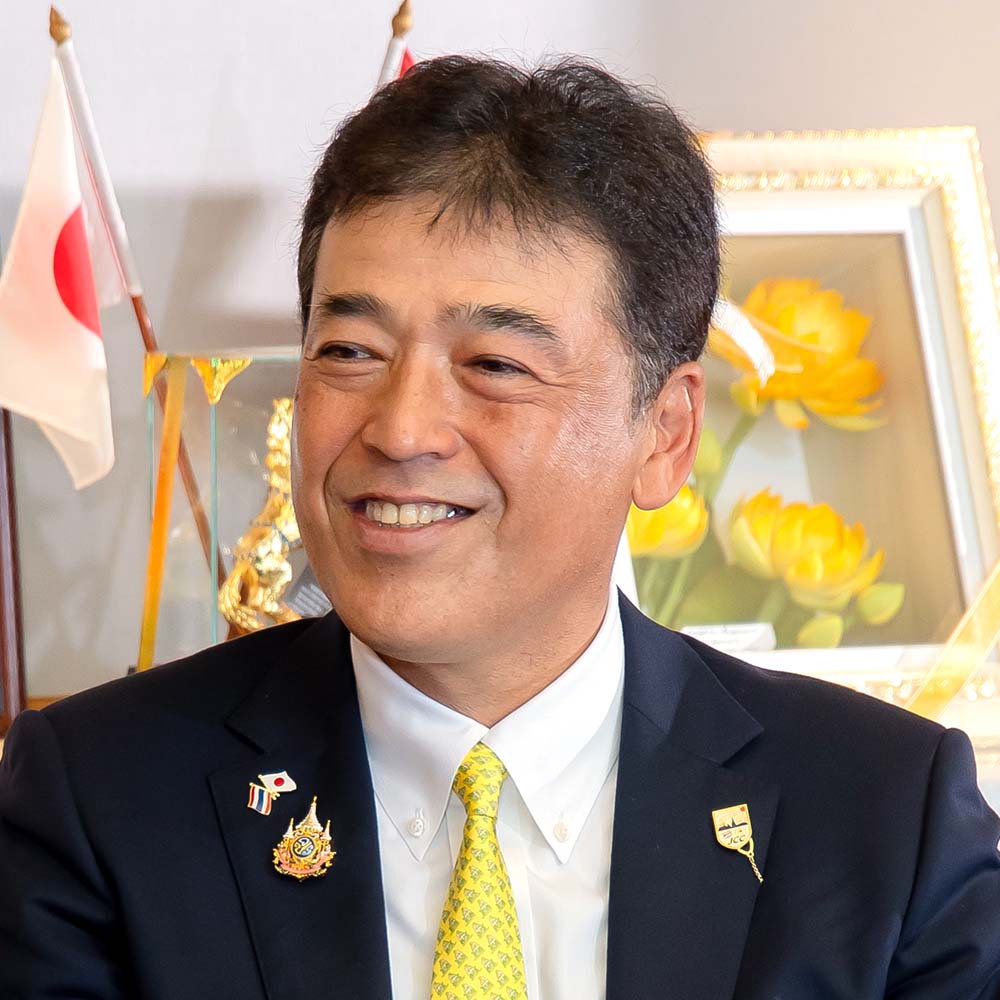For decades, Japan and Thailand have maintained strong economic ties, with Japanese businesses significantly contributing to Thailand’s industrial and service sectors. The Japanese Chamber of Commerce, Bangkok (JCC), has been at the forefront of this partnership, fostering collaboration and ensuring continued growth for both nations. In this exclusive interview, Kozo To, President of JCC, discusses the evolution of the Japanese business community in Thailand, the challenges and opportunities ahead, and the significance of Expo 2025 in Osaka for future cooperation.
Bridges: How has the Japanese business community in Thailand evolved over the years, and what role does JCC play in strengthening economic ties and fostering long-term growth between Japan and Thailand?
To: The presence of Japanese companies in Thailand has expanded significantly, historically tracing back to the 1985 Plaza Accord. This agreement triggered rapid growth, particularly in the manufacturing sector, where Japanese automobile manufacturers and their suppliers established operations. By developing a highly localized supply chain, they contributed to transforming Thailand into a manufacturing and export hub in the ASEAN region. Over time, Japanese companies have extended their presence beyond manufacturing, leading to a substantial concentration of service industries and further strengthening their role in the Thai economy.
Despite facing significant challenges such as the global financial crisis, the 2011 floods, and the COVID-19 pandemic, Japanese companies have remained resilient, continuing to expand their footprint in Thailand. Today, approximately 6,000 Japanese companies operate in Thailand, demonstrating their deep-rooted presence and commitment to the Thai market and job creation.
Amid this growth, the Japanese Chamber of Commerce, Bangkok (JCC) has also evolved alongside the business community. Since its establishment over 70 years ago, JCC has grown from a modest membership of around 30 companies in the 1950s to approximately 1,680 member companies today, making it one of the largest Japanese chambers of commerce worldwide. JCC plays an important role in strengthening economic ties between Japan and Thailand while fostering the long-term growth and prosperity of both nations.
What are the key opportunities and challenges for Japanese businesses operating in Thailand today, and how is JCC supporting them in navigating the evolving economic landscape?
Japanese companies operating in Thailand today face several key challenges and opportunities. The first major challenge is intensifying competition. Japanese companies are not only competing among themselves but also facing increasing rivalry from local Thai enterprises and foreign companies from third countries. Additionally, traditional core industries are undergoing significant transformation, requiring adaptation to new business models and technological advancements. However, the level of progress in areas such as digital transformation (DX) and carbon neutrality (CN) varies among companies, with some making significant strides while others lag behind.
Moreover, like Japan, Thailand is also experiencing a declining birthrate and an aging population, making it essential for businesses to prepare for future social and economic changes.
Over the years, Japan and Thailand have built a solid partnership based on “co-creation,” making the most of each other’s strengths, including through joint ventures.
Kozo To, President of the Japanese Chamber of Commerce (JCC), Bangkok
At the same time, these changes present new opportunities. Companies that embrace this transformation—such as those involved in energy efficiency technologies, renewable energy, and solutions to social challenges—may find greater potential for expansion in Thailand.
In this regard, JCC actively supports Japanese businesses by establishing networking platforms across multiple industries and fostering engagement with local Thai businesses. Furthermore, JCC plays an important role in government proposals, working with the Thai government to improve the business environment and ensure that Japanese companies can operate sustainably in Thailand.
Additionally, to maintain and enhance the presence of Japanese businesses, JCC has long been committed to corporate social responsibility (CSR) initiatives, contributing not only to business activities but also to the well-being of local communities and fostering relations between Japanese enterprises and Thai society.
Expo 2025 in Osaka is centered around “Designing Future Society for Our Lives.” How do you see this theme reflected in the Japanese business community in Thailand, and what key initiatives or collaborations are driving innovation and sustainability between the two nations?
The Osaka-Kansai Expo 2025 has attracted significant interest not only from the JCC but also from Thailand’s local business community. For instance, the Thai Chamber of Commerce (TCC), one of Thailand’s leading economic organizations, has expressed interest, and some of their executives and stakeholders are planning to visit the Expo.
Expo 2025 in Osaka is themed “Designing Future Society for Our Lives.” This theme proposes a new way of building a society that respects diversity and promotes coexistence, serving as a platform for “co-creation” — exploring humanity’s potential and creating a sustainable future. At its core lies the philosophy of recognizing the connections between people, companies, and organizations and collaborating to shape the future together.
JCC’s role in facilitating collaboration, supporting businesses, and promoting sustainability ensures that Japanese companies in Thailand can thrive amid changing global trends.
This philosophy also applies to Japan-Thailand relations. Over the years, Japan and Thailand have built a solid partnership based on “co-creation,” making the most of each other’s strengths, including through joint ventures. Although there have been challenges, such as trade friction in the past, both nations have worked together, sharing knowledge and overcoming difficulties through cooperation. Even when natural disasters and political issues arose, Japanese companies operating in Thailand did not withdraw; instead, both sides collaborated to address these challenges. Japan-Thailand relations can truly be seen as a history of putting the Expo’s spirit of “co-creation” into practice.
As mentioned earlier, we are entering a period of great transformation, including global efforts toward environmental sustainability. Thailand faces numerous social and business challenges, such as an aging population, a shrinking domestic market, and the need for decarbonization and digital transformation. However, JCC hopes that no matter how the business landscape changes, Japanese and Thai companies will continue to leverage their respective strengths, incorporate innovative technologies—such as those from startups—and work together with all stakeholders to solve social issues and realize a brighter future society through the spirit of “co-creation.”
As the business landscape continues to evolve, the enduring partnership between Japan and Thailand remains a crucial pillar of economic cooperation in the region. JCC’s role in facilitating collaboration, supporting businesses, and promoting sustainability ensures that Japanese companies in Thailand can thrive amid changing global trends. With Expo 2025 serving as a platform for further innovation and co-creation, the future holds promising opportunities for both nations to work together towards a shared prosperity and sustainable growth.





